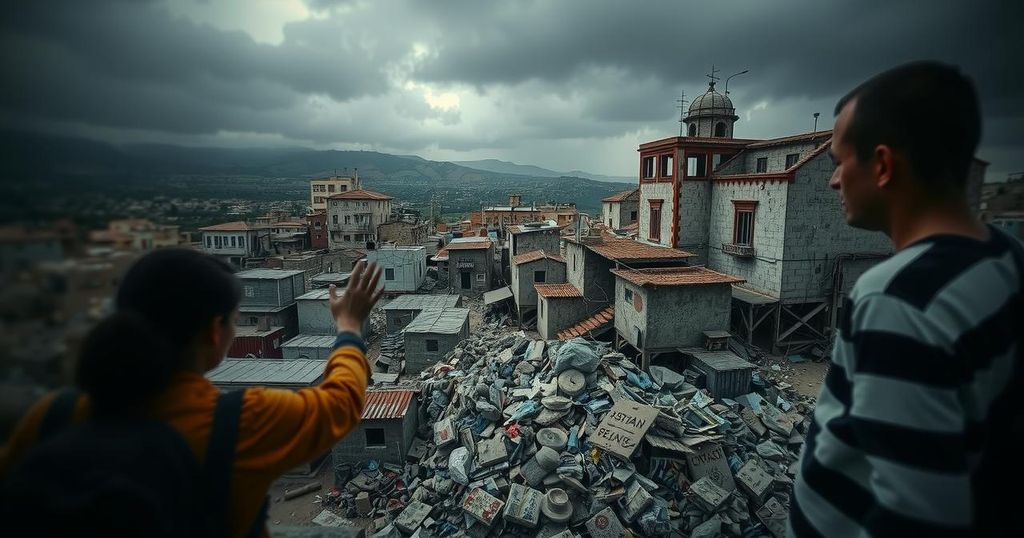Syrians in Lebanon Face Renewed Displacement Amid Ongoing Conflict

Syrians in Lebanon who previously fled the civil war face renewed displacement due to recent hostilities, with many now sleeping rough amid economic struggles and local antagonism. Over one million individuals have been uprooted since October 2023, with the UN detailing significant secondary displacements among Syrians. Humanitarian organizations are advocating for urgent support; however, increasing anti-Syrian sentiments complicate assistance efforts amid a deteriorating economic landscape.
As the ongoing conflict in Lebanon intensifies, many Syrians displaced by their homeland’s civil war are once again facing displacement. Following Israel’s military actions against Hezbollah, over one million individuals have been forced from their homes, exacerbating the plight of Syrian refugees who remain fearful of returning due to potential conscription or arrest. The situation is dire, with significant numbers of Syrians sleeping rough in cities like Sidon and continuing to struggle against economic hardships, limited access to necessary services, and local hostility. Since the onset of hostilities on October 8, 2023, over 1.2 million people have been displaced across Lebanon, including approximately 34,000 Syrians noted by the UN Refugee Agency (UNHCR) as secondary displacements. With escalating violence disrupting communities and reclaiming memories of Lebanon’s tumultuous past, Syrians find themselves caught between lingering fears of returning to their homeland and the increasingly challenging conditions in Lebanon. The UNHCR’s spokesperson, Lisa Abou Khaled, highlights the critical vulnerability faced by these individuals as they navigate their uncertain futures. The socioeconomic environment in Lebanon worsens, with the Lebanese government providing limited assistance to displaced Syrians and asserting that local needs take precedence. Reports indicate that municipalities are prioritizing displaced Lebanese families, leading to many Syrians being denied basic necessities such as housing and support. Municipalities have employed restrictions in an attempt to manage shelter capacities, further exacerbating the difficulties encountered by these markable refugees. Many displaced Syrians now reside in informal camps or abandoned structures, with cold weather rapidly approaching. Amid these adversities, prominent humanitarian organizations, including UNHCR and MedGlobal, are advocating for the protection and support that Syrians urgently require. Nevertheless, Lebanese politicians are often advancing anti-Syrian sentiments, insisting that conditions in Syria have improved enough for repatriation, a notion that contradicts findings from human rights organizations that assert no part of Syria is safe for returnees. Despite these challenges, UNHCR is striving to secure shelter solutions, urging for humanitarian adherence across all groups affected by the ongoing crises. As this complex situation evolves, it remains crucial for the international community to recognize the dire circumstances faced by Syrian refugees in Lebanon and to extend support and protection in a compassionate manner. UNHCR continues its call for equal access to help, emphasizing that both Syrian and Lebanese individuals are equally entitled to safety and dignity during this unprecedented ordeal.
The ongoing conflict in Lebanon has led to a complicated humanitarian crisis, characterized by the displacement of both Lebanese citizens and Syrian refugees. Many Syrians who fled their homeland due to the protracted civil war now encounter additional layers of challenges as violent skirmishes resume along the border, destabilizing their fragile living conditions in Lebanon. The UN Refugee Agency (UNHCR) reports substantial numbers of secondary displacements among Syrian refugees, reflecting the heightened vulnerability faced by those already burdened by years of conflict and strife. With political tensions exacerbated by socioeconomic factors, the plight of these individuals demands urgent attention and action.
In conclusion, the situation for Syrian refugees in Lebanon is severely worsened by the recent hostilities, with a significant increase in displacement and an ongoing struggle for basic human rights and safety. The persistent challenges of inadequate shelter, lack of access to essential services, and social hostilities necessitate a more robust response from humanitarian organizations and the international community. Only by acknowledging and addressing these urgent needs can we begin to ensure that both Syrian and Lebanese populations receive equitable assistance during this crisis.
Original Source: www.arabnews.com








